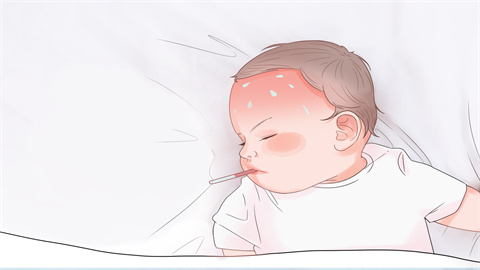What causes fever and convulsions in children?
Generally, convulsions accompanying fever in children may be caused by factors such as an immature nervous system, sudden temperature increases stimulating nerves, febrile seizures, acute meningitis, or viral encephalitis. It is advisable to seek timely medical attention, identify the underlying cause, and proceed with symptomatic treatment under a doctor's guidance. Detailed explanations are as follows:

1. Immature nervous system development: A child's cerebral cortex function is not yet fully developed, and the tolerance for temperature fluctuations is poor. Fever may easily trigger abnormal nerve discharges, leading to convulsions. Daily monitoring of body temperature is necessary, and physical cooling methods, such as wiping the forehead and armpits with lukewarm water, should be promptly applied when the temperature exceeds 38°C, to prevent sudden temperature increases.
2. Sudden temperature rise stimulating nerves: When fever rapidly elevates body temperature beyond 39°C within a short time, it directly stimulates the brain nerves, inducing convulsions. If a rapid temperature increase is detected, antipyretic medications such as paracetamol suspension drops, ibuprofen suspension, or pediatric Chai Gui antipyretic granules may be administered according to medical advice.
3. Febrile seizures: Commonly occur in children aged 6 months to 5 years. Convulsions are triggered by abnormally excited brain neurons during fever and typically last for several minutes. During convulsions, position the child on their side, clear oral secretions to prevent suffocation, and after the episode subsides, medications such as diazepam tablets, sodium phenobarbital tablets, or sodium valproate oral solution may be used according to medical advice to prevent recurrence.
4. Acute meningitis: Inflammation caused by bacterial or viral infection of the meninges stimulates brain tissue, resulting in fever-induced convulsions, often accompanied by severe headache and vomiting. For bacterial infections, anti-infective medications such as ceftriaxone sodium injection, amoxicillin-clavulanate potassium injection, or vancomycin injection should be administered according to medical advice to control inflammation.
5. Viral encephalitis: Inflammation caused by viral invasion of brain tissue affects nerve function, causing fever-induced convulsions along with listlessness and drowsiness. Antiviral medications such as acyclovir injection, ganciclovir injection, or ribavirin injection should be used as directed by a physician. Concurrently, mannitol injection may be administered to reduce intracranial pressure and alleviate brain tissue damage.
Daily care should ensure the child is kept warm to avoid catching a chill that might lead to fever, and adequate hydration must be maintained during fever. During convulsions, never forcibly restrain the limbs to avoid fractures or dislocations. After the symptoms subside, promptly transport the child to a hospital for examination, identify the underlying cause, and undergo proper treatment.




